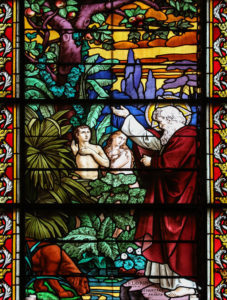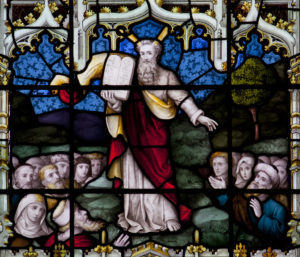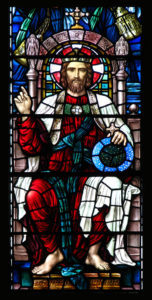Empowering the Greatest Commandment
 Christianity is not based in the teachings of Jesus, and in fact much of modern Christianity is antithetical to the teachings of Jesus. It will therefore be impossible for us to tinker around the edge of Christianity, soften it here and firm it up there, perhaps remove some later accretions, and thereby transform it into the spiritual movement Jesus came to earth to begin. If we really intend to follow Jesus, our only option is to rescue the Lord and His Word from the false religion that has prevented His teachings from uplifting the world, and let that religion just fade away.
Christianity is not based in the teachings of Jesus, and in fact much of modern Christianity is antithetical to the teachings of Jesus. It will therefore be impossible for us to tinker around the edge of Christianity, soften it here and firm it up there, perhaps remove some later accretions, and thereby transform it into the spiritual movement Jesus came to earth to begin. If we really intend to follow Jesus, our only option is to rescue the Lord and His Word from the false religion that has prevented His teachings from uplifting the world, and let that religion just fade away.
The way Christianity treats the Son of God like nothing more than a prop is appalling. When the Catholic church has had continuous custody of the Gospels for two thousand years, when the first Biblical translation into English dates back to the sixteenth century, and when to date the Bible has been translated into 698 different languages, how is it possible that literally no prominent modern Christian denomination gives the Lord’s teachings as they are set forth in the canonical Gospels anything more than lip-service?
We have talked here repeatedly about the differences between the Gospels and Christianity. We have demonstrated Christianity’s troubling history, shown how individual Christian teachings are bogus, and also spent time carefully reading the Gospels in modern English as we strive to ever better understand the genuine meaning and message of Jesus. But it occurs to me now that in giving you a constant fire hose of information, I really am not serving you well. I realized during the Christmas season that what you need in order for you to see how hopeless it is for us to try to fix modern-day Christianity is the clarity of pinning down the anti-Jesus teaching that is Christianity’s core message.
 Jesus tells us in the Gospels that in coming to us two thousand years ago He had at least five goals in mind:
Jesus tells us in the Gospels that in coming to us two thousand years ago He had at least five goals in mind:
He Came to Abolish Our Need for Religions
He Came to Teach Us to be Seekers
He Came to Teach Us How to Relate to God on Our Own
He Came to Teach us How to Grow Spiritually
He Came to Bring the Kingdom of God on Earth
And Jesus had a sixth purpose, too, which seems more subtle to readers of the Gospels because as they are translated into modern English this core purpose is never bluntly stated. But this purpose is central to all the others! Unless we include it, we make our actually following the teachings of Jesus much more difficult:
* Jesus Came to Give Us a New Definition of Right and Wrong
To put it plainly, Jesus came to abolish the very notion of “sin.” The dictionary definition of sin is “an act of transgression against divine law,” which makes the word culturally malleable, doesn’t it? What is against divine law in one culture might be divinely mandated in another. But in fact, Jesus intended to do away with all divinely mandated rules. He outmoded the concept of sin altogether! And I think now that the fact that Christianity is based in the notion that we are all sinful is the central reason why the religion is so irredeemably flawed.
Christianity is based in the Old Testament; in the teachings of Paul; in the needs of the early Roman church-builders; and in the random tweaks of lesser church leaders. And in nearly all of the more than forty thousand versions of Christianity now extant,  the notion that Jesus came to die for our sins is central! I spent fifty years of my life first as an ardent Protestant, then after my marriage as an ardent Catholic. Christianity was even my college major, so I do indeed know the religion. And this beautiful Christmas carol that once upon a time I loved is Christianity at its core:
the notion that Jesus came to die for our sins is central! I spent fifty years of my life first as an ardent Protestant, then after my marriage as an ardent Catholic. Christianity was even my college major, so I do indeed know the religion. And this beautiful Christmas carol that once upon a time I loved is Christianity at its core:
I wonder as I wander out under the sky
How Jesus my Saviour did come for to die
For poor ornry people like you and like I.
I wonder as I wander out under the sky.
“I Wonder as I Wander” was written in the 1930s, based on fragments of an Appalachian folk song. These words express the guilt and shame that all of us are meant to feel because we are so sinful that a sinless Jesus had to suffer the horrible death we all deserve.
But Jesus emphatically did not “come for to die”! If that had been His purpose, He would never have needed to speak a word, and in fact His spending those three-plus years teaching would have delayed and detracted from His holy purpose. We have no right to impose our own interpretations on the Lord’s work, nor to take him at anything less than His Word! And He plainly tells us that He came to us as the kind of disrupter who will pluck grain on the Sabbath (MT 12:1-5), will dine with undesirables (MT 9:9-15), will refuse to punish sinners (JN 8:3-11), and will physically attack people for going about their lawful business (JN 2:13-16). In fact, He came to transform everything! He had to do it cleverly, since in His day speaking against the prevailing religion was a capital crime; and when you realize that, you read the Gospels with a fresh sense of admiration. Sometimes you and I have to read between His careful lines a bit, but when we do that His meaning is plain. Often, He waited until He could answer somebody’s apt question so the Temple guards who were always listening wouldn’t hear Him introducing something radical just on His own initiative. Then when He got the right question, He hit it out of the park!
One day someone asked Jesus what was the greatest commandment, and He didn’t  name any of the Ten Commandments. Those Ten Commandments are religious laws. They are proscriptions against sins, so if His purpose is to do away with the concept of sin He will have to do away with all those commandments. Now, let’s watch Him do it! When He was asked what was the greatest Commandment, instead of naming any of the Ten, Jesus gave his listeners God’s new Law of Love. He said, “‘You shall love the Lord your God with all your heart, and with all your soul, and with all your mind.’ This is the great and foremost commandment. The second is like it, ‘You shall love your neighbor as yourself’” (MT 22:37-39). Since love is not even mentioned in the Ten Commandments, this answer was far more radical than it seems to us now! He was giving us two new commandments and placing them above the Ten Commandments that God had given to Moses long before. He could have stopped right there, and the fact that He didn’t stop there should be a topic for sermons and homilies in every church on earth. His next words were, “On these two commandments depend the whole Law and the Prophets” (MT 22:40). “The Law and the Prophets” was what the Jews
name any of the Ten Commandments. Those Ten Commandments are religious laws. They are proscriptions against sins, so if His purpose is to do away with the concept of sin He will have to do away with all those commandments. Now, let’s watch Him do it! When He was asked what was the greatest Commandment, instead of naming any of the Ten, Jesus gave his listeners God’s new Law of Love. He said, “‘You shall love the Lord your God with all your heart, and with all your soul, and with all your mind.’ This is the great and foremost commandment. The second is like it, ‘You shall love your neighbor as yourself’” (MT 22:37-39). Since love is not even mentioned in the Ten Commandments, this answer was far more radical than it seems to us now! He was giving us two new commandments and placing them above the Ten Commandments that God had given to Moses long before. He could have stopped right there, and the fact that He didn’t stop there should be a topic for sermons and homilies in every church on earth. His next words were, “On these two commandments depend the whole Law and the Prophets” (MT 22:40). “The Law and the Prophets” was what the Jews  of His day called our Old Testament. The whole concept of sin is grounded in religious laws, and in summing up the Old Testament this way, Jesus was discarding every Jewish law and replacing them all with God’s Law of Love. He was abolishing sin, by definition! And He confirmed that His abandonment of sin-based religious laws was deliberate when He also said, “Do not think that I came to abolish the Law or the Prophets; I did not come to abolish but to fulfill” (MT 5:17). He was indeed fulfilling all prophesy, and thereby beginning our whole new relationship with God. He was introducing God’s reign on earth as only perfect eternal love!
of His day called our Old Testament. The whole concept of sin is grounded in religious laws, and in summing up the Old Testament this way, Jesus was discarding every Jewish law and replacing them all with God’s Law of Love. He was abolishing sin, by definition! And He confirmed that His abandonment of sin-based religious laws was deliberate when He also said, “Do not think that I came to abolish the Law or the Prophets; I did not come to abolish but to fulfill” (MT 5:17). He was indeed fulfilling all prophesy, and thereby beginning our whole new relationship with God. He was introducing God’s reign on earth as only perfect eternal love!
We know now that all that exists is consciousness, and that it exists in a range of vibrations from fear at the lowest to love at the highest. So we can understand now why it was so important to Jesus that He do away with fear-based religious laws when He brought us God’s new Law of Love, since if the notion of sin remains as a burden on humanity then our learning to love and thereby raising the consciousness vibration of this planet becomes a great deal harder. He had to abolish the notion that any act can be sinful on its face. From the day that Jesus first spoke those words, we must not consider any act to be arbitrarily divinely proscribed! From then on, the only question is whether you are doing whatever you are doing for some selfish personal reason, or whether you do it purely and entirely out of love.
It is important to add that God didn’t change! What Jesus was doing was just removing from the religion of the world’s first true monotheists all the fear-based human corruptions that had allowed for easier control of the people. Love hadn’t been much emphasized before, although we find it throughout the Law and the Prophets; and  when Jesus removes the human-caused fear, then that love shines even where it is not called love. God didn’t change by a single jot. It was people’s understanding of God that Jesus came to change.
when Jesus removes the human-caused fear, then that love shines even where it is not called love. God didn’t change by a single jot. It was people’s understanding of God that Jesus came to change.
For example, Micah of Moresheth was an early Hebrew prophet, a contemporary of the great Isaiah. He spoke in particular against religiosity and the notion that God wants our sacrifices, and a full eight centuries before the birth of Jesus Micah previewed the Lord’s whole Gospel message. He said, “With what shall I come to the Lord and bow myself before the God on high? Shall I come to Him with burnt offerings, with yearling calves? Does the Lord take delight in thousands of rams, in ten thousand rivers of oil? Shall I present my firstborn for my rebellious acts, the fruit of my body for the sin of my soul? He has told you, O man, what is good; and what does the Lord require of you but to do justice, to love kindness, and to walk humbly with your God?” (Micah 6:6-8)
What God asked of us three thousand years ago is just what God still asks today! For a long time I felt an urgency about separating Jesus from Christianity, fretting that as the religion declines we might mistakenly throw out the Baby with the bathwater. But with every day that you and I study and proclaim the Lord’s Gospel teachings, we further lessen that risk. Jesus still calls us to follow Him, and every day more and more of us are  choosing to leave Christianity behind so we can follow the Lord. And as we do that, He tells us we are making Him glad! He says, “If you hold to my teaching, you are really my disciples. Then you will know the truth, and the truth will set you free.” (JN 8:31-32)
choosing to leave Christianity behind so we can follow the Lord. And as we do that, He tells us we are making Him glad! He says, “If you hold to my teaching, you are really my disciples. Then you will know the truth, and the truth will set you free.” (JN 8:31-32)
Learning to live without a concept of sin is a much bigger challenge than it might seem. If we truly mean to follow Jesus, then we must enter a whole new world! Let’s begin to explore that world next week….
Stained glass Adam & Eve photo credit: Lawrence OP Blame Game via photopin (license)
Stained glass Annunciation photo credit: Lawrence OP Detroit Annunciation via photopin (license)
Stained glass spiral photo credit: Nine is the Magic Number Detail via photopin (license)
Moses photo credit: Lawrence OP Moses and the Law via photopin (license)
Wrecked church organ photo credit: Thomas James Caldwell King of Instruments via photopin (license)
Lord enthroned photo credit: Lawrence OP Lord enthroned… via photopin (license)
The post Empowering the Greatest Commandment appeared first on Roberta Grimes.



